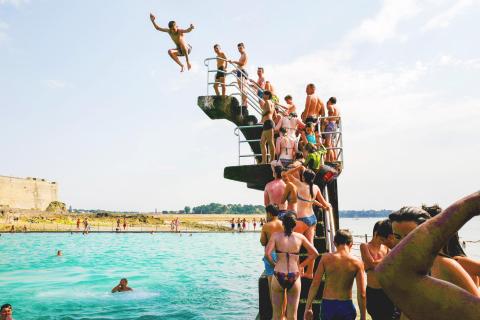Paris is going through its driest period in almost 150 years and temperatures across Europe are continuing to reach extreme levels, leaving scorched fields and farmers frustrated by another spell of bad weather.
In the east German state of Mecklenburg-Western Pomerania, Christa-Maria Wendig is worried these once-rare droughts are becoming common.
She plans to give up planting rapeseed in the coming months because of the dry weather and the heat wave that has stunted her ripening corn crop.

Photo: AFP
“Our ponds are empty and the meadows withered,” she said.
As temperatures keep climbing across Europe this week, expected to peak today in Paris and London, the effects of extreme weather are becoming clearer.
This summer has already seen raging wildfires in Portugal and Spain, falling water levels on Germany’s Rhine River and irrigation restrictions in France.
Day-ahead electricity prices in France hit a five-month high on Tuesday. In Paris, temperatures yesterday were forecast to hit 42°C.
Electricite de France SA plans to halt two nuclear reactors at Golfech this week, as the Garonne River becomes too warm to cool the plant.
The company, which produces about three-quarters of France’s power, has said it would prepare nuclear plants to operate in more severe heat waves in the coming decades amid a changing climate.
In agriculture, the heatwave is having the biggest impact on corn fields, which are in a key growth stage. Yields would drop sharply if beneficial rains do not arrive soon, German grains handler Agravis Raiffeisen AG said.
Winter wheat and barley are already being collected and have escaped most of the bad weather.
Some farmers in France and Germany might harvest corn early as silage to build up their animal-feed supplies for the winter, rather than collecting the crops as grain to sell on the market, Strategie Grains analyst Laurine Simon said.
Forage stocks are already low after last year’s drought and Paris corn futures are up about 10 percent since late May.
In the east German state of Brandenburg, where farmers are contending with the third straight summer of drought conditions, industry representatives have called for emergency aid from the state and federal governments.
While the dry spell is not yet as severe as the one seen last year, farmers are still expecting smaller-than-usual grain harvests.
“There is no question of us relaxing,” Brandenburg LBV farmers’ association head Henrik Wendorff said.
“The kind of bumper harvest that would have enabled us to compensate for the harsh losses of the previous year won’t be there,” he said.

POLITICAL PATRIARCHS: Recent clashes between Thailand and Cambodia are driven by an escalating feud between rival political families, analysts say The dispute over Thailand and Cambodia’s contested border, which dates back more than a century to disagreements over colonial-era maps, has broken into conflict before. However, the most recent clashes, which erupted on Thursday, have been fueled by another factor: a bitter feud between two powerful political patriarchs. Cambodian Senate President and former prime minister Hun Sen, 72, and former Thai prime minister Thaksin Shinawatra, 76, were once such close friends that they reportedly called one another brothers. Hun Sen has, over the years, supported Thaksin’s family during their long-running power struggle with Thailand’s military. Thaksin and his sister Yingluck stayed

In the sweltering streets of Jakarta, buskers carry towering, hollow puppets and pass around a bucket for donations. Now, they fear becoming outlaws. City authorities said they would crack down on use of the sacred ondel-ondel puppets, which can stand as tall as a truck, and they are drafting legislation to remove what they view as a street nuisance. Performances featuring the puppets — originally used by Jakarta’s Betawi people to ward off evil spirits — would be allowed only at set events. The ban could leave many ondel-ondel buskers in Jakarta jobless. “I am confused and anxious. I fear getting raided or even

Kemal Ozdemir looked up at the bare peaks of Mount Cilo in Turkey’s Kurdish majority southeast. “There were glaciers 10 years ago,” he recalled under a cloudless sky. A mountain guide for 15 years, Ozdemir then turned toward the torrent carrying dozens of blocks of ice below a slope covered with grass and rocks — a sign of glacier loss being exacerbated by global warming. “You can see that there are quite a few pieces of glacier in the water right now ... the reason why the waterfalls flow lushly actually shows us how fast the ice is melting,” he said.

Residents across Japan’s Pacific coast yesterday rushed to higher ground as tsunami warnings following a massive earthquake off Russia’s far east resurfaced painful memories and lessons from the devastating 2011 earthquake and nuclear disaster. Television banners flashed “TSUNAMI! EVACUATE!” and similar warnings as most broadcasters cut regular programming to issue warnings and evacuation orders, as tsunami waves approached Japan’s shores. “Do not be glued to the screen. Evacuate now,” a news presenter at public broadcaster NHK shouted. The warnings resurfaced memories of the March 11, 2011, earthquake, when more than 15,000 people died after a magnitude 9 tremor triggered a massive tsunami that